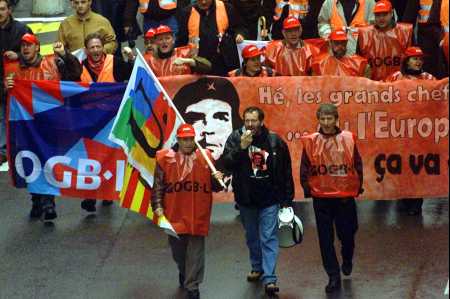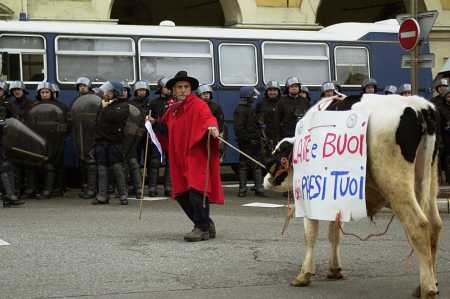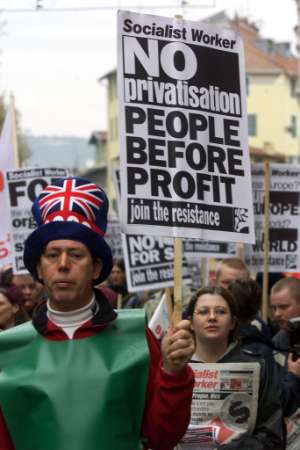Protesters Target EU Summit

[IMC - www.indymedia.org]
by mainstream media 12:09pm Wed Dec 6 '00
Trade unionists and anti-globalisation activists — mainly from France, Spain and Italy --staged the 'Eurodemo' to call for EU-wide social policies. Further protests are planned for the duration of the summit and organisers hope to place a human chain around the conference venue on Thursday when the EU leaders hold their first session of talks.
December 6, 2000
Web posted at: 12:07 PM EST (1707 GMT)

NICE, France — Demonstrators have taken to the streets of Nice ahead of a European Union summit to demand more social justice.
Trade unionists and anti-globalisation activists — mainly from France, Spain and Italy --staged the 'Eurodemo' to call for EU-wide social policies.
Further protests are planned for the duration of the summit and organisers hope to place a human chain around the conference venue on Thursday when the EU leaders hold their first session of talks.

socialist workers
Leaders of the 15 EU states are due to arrive in the heavily guarded city on Wednesday for the summit.
The summit was intended to be a brisk two-day affair to wrap up a new treaty reforming EU institutions, but the French hosts have warned that it could extend well into, or even beyond, the weekend.
The leaders are trying to agree on reforms to equip the EU for the addition of up to15 more nations, including many former Soviet bloc countries, over the next few years.
At the 1997 Amsterdam summit, the leaders failed to agree on the key points on expansion. Under the leadership of the French, which currently holds the rotating EU presidency, they are trying again.
The leaders at Nice have to decide how far to cut back on national vetoes — which allows one country's objections to scupper a planned measure — in favour of qualified majority voting — in which measures can be passed without unanimous agreement.
They are also looking to reach agreement on what comparative "weight" to give the votes of countries that vary enormously in population and economic strength.
Leaders also hope to decide how to trim the size of the European Commission to ease decision-making, and they have to determine whether to permit "enhanced co-operation" — allowing self-selected groups of countries to forge ahead with greater integration without the rest joining in.
Talks will be held on the new Charter of Fundamental Rights and whether it should be legally enforceable and the precise relationship between the new EU defence force and NATO.
At a summit in Biarritz earlier this year, the charter was agreed, but not its precise legal status. There was some progress towards agreement on enhanced co-operation but little progress on the extension of qualified voting majority, the weighting of votes or the number of commissioners.
Small countries are concerned that after re-weighting the larger nations will be able force the European agenda.
Another problem on the eve of the summit has been a falling out between France and Germany — two nations which together have often provided the driving force for EU developments.
The French resent the Germans demanding more votes than France in the European Council, and French Foreign Minister Hubert Vedrine has criticised his German counterpart, Joschka Fischer, as a "pied piper" whose federalist tunes are leading Europe to disappointment.
European Commission President Romano Prodi, who has been imploring national leaders to make concessions on qualified majority voting, says their refusal to do so has produced a stalemate which gives the summit no more than a 50 percent chance of success.